Coffee Details
Tasting Notes
Origin: Honduras El Cielito
Region: Santa Bárbara
Varietal: Pacas, Catuai, Typica
Altitude: 1800 MASL
Process: Washed
Your October Coffee is a Guatemala Quiche

Origin: Honduras El Cielito
Region: Santa Bárbara
Varietal: Pacas, Catuai, Typica
Altitude: 1800 MASL
Process: Washed
Your October Coffee is a Guatemala Quiche

Origin: Guatemala
Region: Quiche
Varietal: Castillo, Caturra, Colombia
Altitude: 1200-1800 MASL
Process: Washed
Your October Coffee is a Guatemala Quiche

Origin: Guatemala
Region: Huehuetenango
Varietal: Catimore, Bourbon, Pache
Altitude: 1200-1400 MASL
Process: Washed
Your June Coffee is Guatemala Waykan

Orgin: Ethiopia
Region: Oromia
Name: Ethiopia Guji
Altitude: 1750-2050 masl
Processing: Washed
Your August 2024 Airdrop is from Ethiopia Guji
Origin: Colombia
Region: Quindio
Varietal: Caturra
Altitude: 1350-1600 MASL
Process: Washed
Your July Coffee is from Quindio Colombia

Orgin: Mexico
Region: Huatusco, Veracruz
Name: Seleccion Huatusco
Altitude: 1200-1400 masl
Processing: Washed with extended fermentation
Your June 2024 Airdrop is Mexico Seleccion HuatuscoMexican coffee thrives in 15 southern states, with the best beans coming from Veracruz, Oaxaca, Chiapas, and Puebla. Picture the lush highlands of Veracruz, the misty mountains of Oaxaca, and the vibrant slopes of Chiapas—each a coffee lover's dream.
In Huatusco, Veracruz, abundant rainfall creates the perfect environment for coffee growth. However, this blessing also brings challenges. The wet days and chilly nights necessitate mechanical drying and extend fermentation, adding a unique character to the beans.
Imagine the Zilli and Sampieri families carefully pulping their coffee cherries, adding a starter culture to the fermentation tanks, and extending fermentation to unlock rich flavors. After washing, the beans are centrifugated, pre-dried, and meticulously machine-dried for 30-36 hours, ensuring each bean's perfection. This process, full of dedication and passion, results in a truly extraordinary coffee experience. This coffee is often described as having a heavy body with a sweet and satisfying finish, making it a favorite among coffee enthusiasts.
Varietal: Costa Rica, Colombia
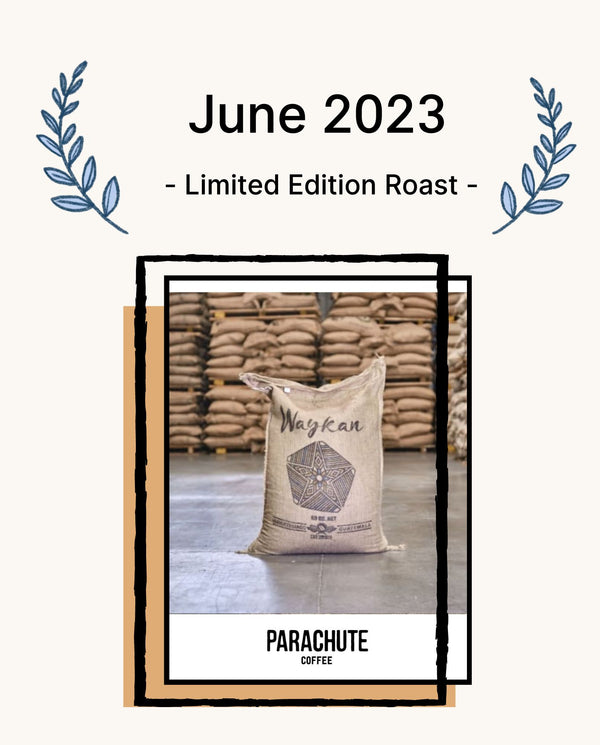
Origin: Guatemala
Region: Huehuetenango
Varietal: Catimore, Bourbon, Pache
Altitude: 1200-1400 MASL
Process: Washed
Your June Coffee is Guatemala Waykan
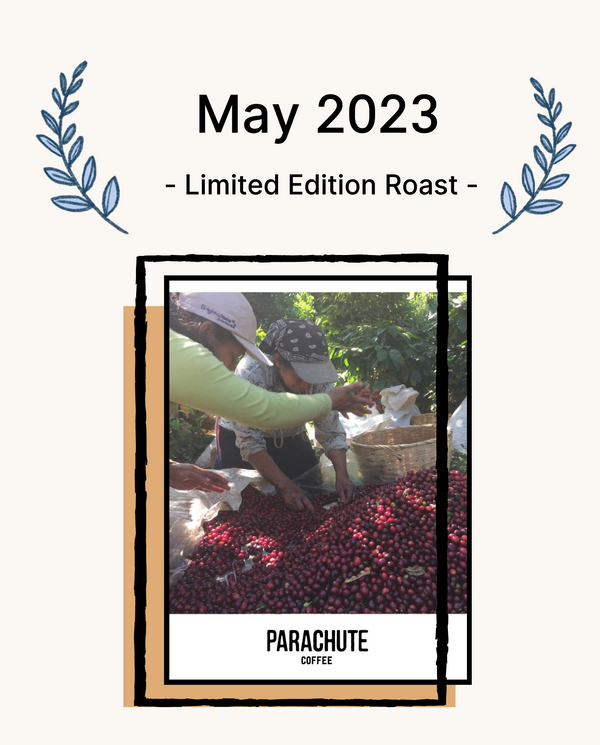
Country: El Salvador
Region: Chalchuapa, Santa Ana
Name: Beneficio Las Cruces
Altitude: 1350 masl
Processing: Kenya Soaked
Your MAY Coffee is El Salvador Beneficio Las CrucesEl Salvador's specialty coffee thrives near volcanoes, where ash and sulfur create complex flavors. This coffee is grown in a region blessed with Pacific ocean breezes and shade from macadamia and peach trees, promoting slower maturation and nuanced flavors. They have also embraced environmentally friendly practices in their operations, including water-saving techniques and using eco-friendly pulping machines to minimize the environmental impact.
This lot undergoes the Soaked Selection Kenya Washed process, managed by the JASAL Group. After de-pulping and washing, the beans are soaked in clean water for 10-12 hours. This East African technique results in a cleaner, brighter, and fruitier cup of coffee, reflecting the unique terroir and meticulous processing.
VARIETY : BOURBON
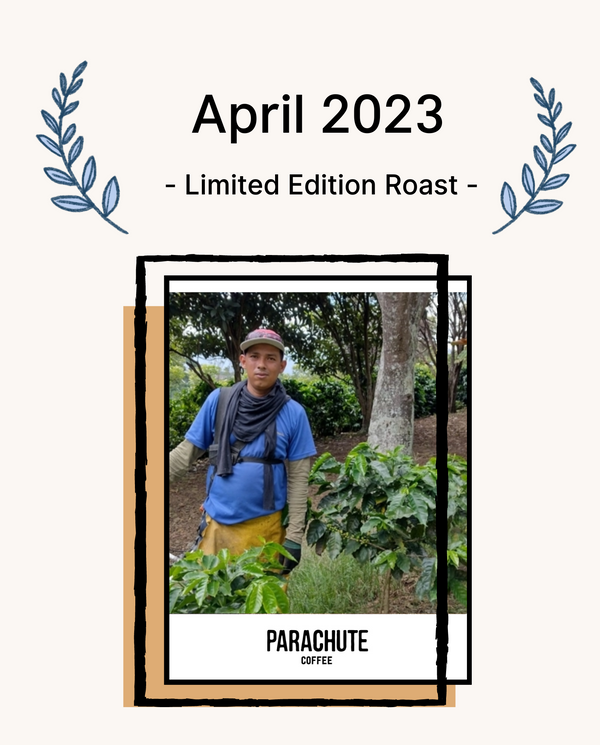
Country: Costa Rica
Name: Finca Higuerones
Altitude: 1250 masl
Process: Washed
Your APRIL Coffee is Costa Rica Finca Higuerones
Costa Rica's Finca Higuerones is an estate owned by Coopelibertad, purchased in the mid-90s. It is recognized for the massive Higuerones trees on the property, which provide shade for the coffee plants. The farm holds certification from the Nama Cafe project, which partners with producers to reduce environmental impact. Finca Higuerones processes its coffee as fully-washed and dries it for 5-6 days on a patio, followed by 24-hour mechanical drying. The estate's involvement with Coopelibertad, the largest cooperative in the Central Valley, ensures support for small producers and sustainable coffee farming practices. They provide education and welfare resources, farming assistance, and have many cherry collection points throughout the region.
Variety: Catuai, CATURRA
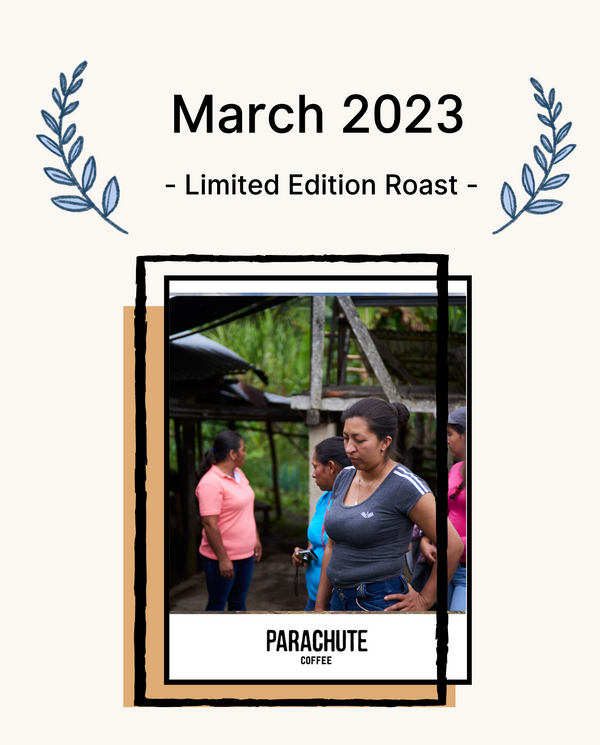
Country: Colombia
Name: Colombia Totoró
Region: Cauca
Altitude: 1400-2000 meters asl
Process: Washed
Your March Coffee is Colombia Totoró
Totoró coffee is grown at high altitudes, typically between 1,800 and 2,200 meters above sea level. The coffee plants benefit from the area's volcanic soil, ample rainfall, and abundant sunshine, which contribute to the unique flavor of the coffee.
One of the defining characteristics of Colombia Totoró coffee is its sweet, fruity notes, which are reminiscent of berries and citrus. The coffee is also known for its bright acidity, which gives it a crisp, refreshing taste. Additionally, Totoró coffee is often described as having a medium body and a smooth, clean finish.
Variety: Columbia, Castillo, Caturra
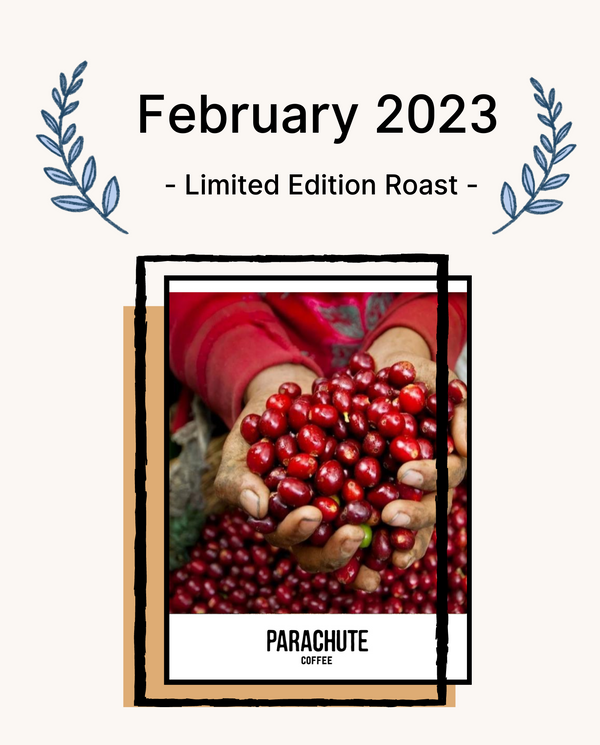
Country: El Salvador
Name: El Salvador Santa Ana
Altitude: 1200-1600 masl
Process: Washed
Your February Coffee is El Salvador Santa Ana
Known as “the land of volcanoes,” El Salvador is the smallest Central American country. The coffee grown in the Santa Ana region of El Salvador is known for its unique flavor profile, which is largely due to the combination of its terroir (the soil, climate, and topography of the growing region) and the care and attention given to the coffee plants by local farmers. The high altitude and volcanic soil in the region provide ideal growing conditions for coffee, and the use of sustainable and environmentally-friendly farming practices, such as shade-grown coffee and responsible water usage, helps to preserve the delicate balance of the ecosystem and contributes to the quality of the coffee.
This month's coffee is medium to light-bodied, with bright acidity and a well-balanced sweetness. These bright and zesty notes make El Salvador Santa Ana coffee an excellent choice for a morning or mid-day coffee, as it provides a refreshing and invigorating start to the day.
It is often said that the Cup of Excellence competition, which came to El Salvador in 2003, was the beginning of the new “wave” of interest in Salvadoran coffee, shining the first light on some of the special varieties the small country grows.
Variety: Bourbon, Caturra, Pacas, Pacamara
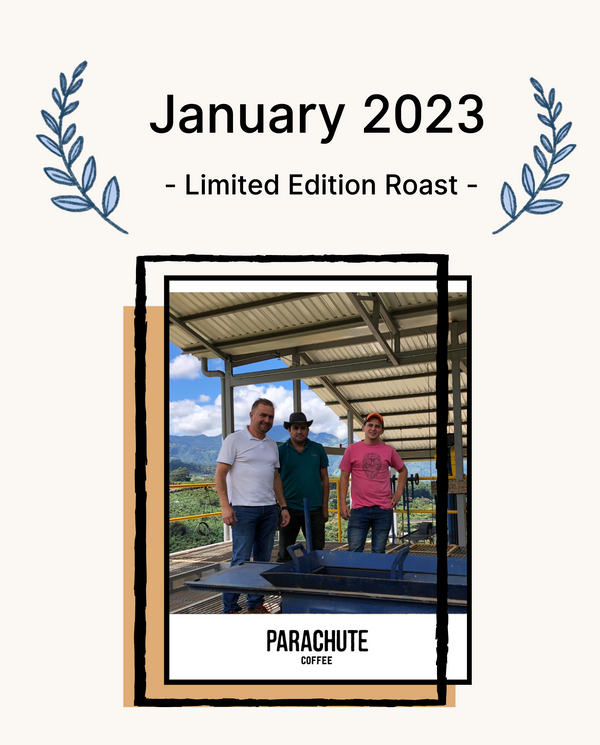
Country: Costa Rica
Name: Finca Las Hermanas
Producer: Eduardo Navarro Jiminez
Farm: Coffee NACE Mill
Altitude: 1200-1900 masl
Process: Yellow Honey Processed
Your JANUARY Coffee is Costa Rica finca Las Hermanas
Eduardo Navarro Jiminez and his brother Juan Carlos Navarro Ceciliano share a 100-year family history in coffee production. The brothers and their other sibling own several farms, and in 2016 Eduardo established Coffee NACE Micromill. An important part of Juan and his brother Eduoardo's mission statement is, "Sabemos que unidos somos capaces de lograr lo imposible," or "We know that together we are capable of achieving the impossible."
Microlots from Costa Rica are sourced from producers that invested not only in growing their farms, but also in building and operating their own processing facilities, typically called "micromills." Micromills yield fewer than 1,000 bags yearly, and are often independently owned by a family or small group. Microlots in Costa Rica are separated out based on differentiated characterizations such as processing, variety, or some other aspect. Microlots carry the highest quality as well as the highest
level of traceability.
VARIETY: CATURRA, CATUAI, COSTA RICA 95
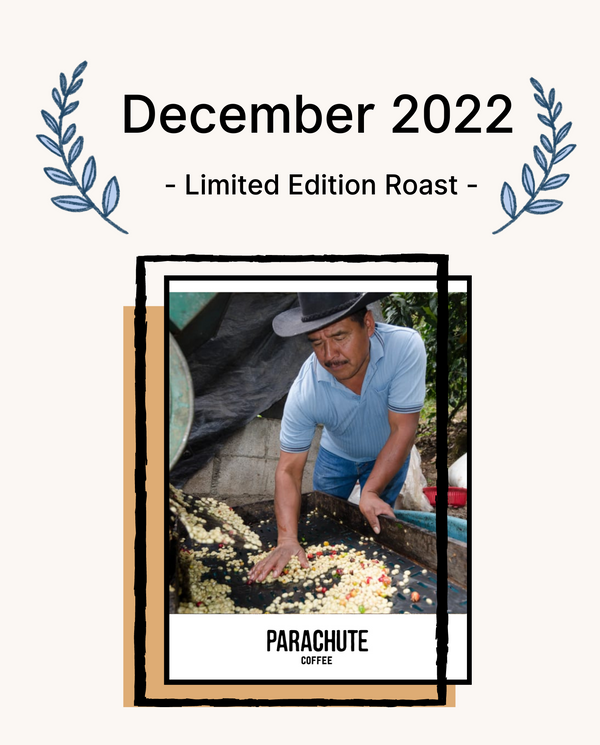
Country: Guatemala
Name: Finca Quejina
Region: Huehuetenango
Altitude: 2050 meters asl
Process: Washed
Your December Coffee is Guatemala Finca Quejna
If the perfect coffee exists, it likely grows in Guatemala. This month's pick is a great example. Nicolás Ramirez Ramirez owns Finca Quejina, where he grows several coffee varieties on land that have been in his family for many years. At first, it was a forest, but it has had coffee planted for a long time now. Coffee is the only crop grown for sale on Quejina. The coffee is picked ripe and de-pulped the same day, fermented for 18–24 hours, and then washed before being dried for 3.5–4.5 days, depending on the climate.
VARIETAL: BOURBON, CATIMOR, CATURRA, MARAGOGYPE, PACHE
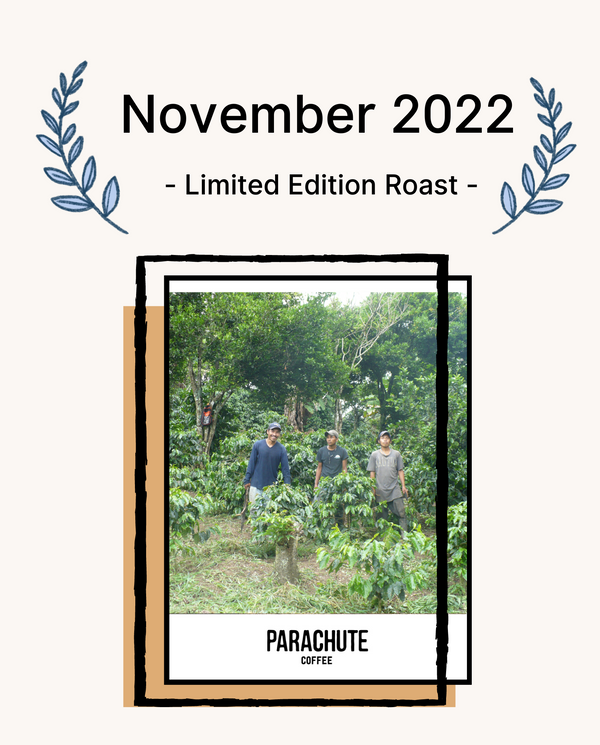
Country: Honduras
Name: Elvin Suazo
Producer: Finca Rancho Escondido
Region: Montecillos, La Paz
Altitude: 1600 MASL
Process: Washed
Your November Coffee is Honduras Finca Rancho Escondido
Finca Rancho Escondido is owned and managed by Elvin Suazo. His 25-hectare farm holds an impressive 90,000 coffee trees. Just as impressive is his processing infrastructure. After harvesting, his coffee is mechanically de-pulped, fermented for 30 hours, and dried on nylon mesh raised beds for two weeks.
Washed coffee in Honduras will vary from producer to producer, but typically the coffee is picked ripe and de-pulped the same day, then fermented for 12–24 hours in open-air tanks. It is then washed clean of mucilage and spread on patios or raised beds to dry. The drying process can take an average of 15 days, depending on the weather.
La Paz, an area famous for coffee production in Honduras, has high elevation and cool temperatures. These factors cause coffees to ripen slowly, developing sugars that are then processed in these comfortable climates. These coffees have high fruity sweetness with flavors of berries or peach
VARIETAL: CATUAI, PACAS
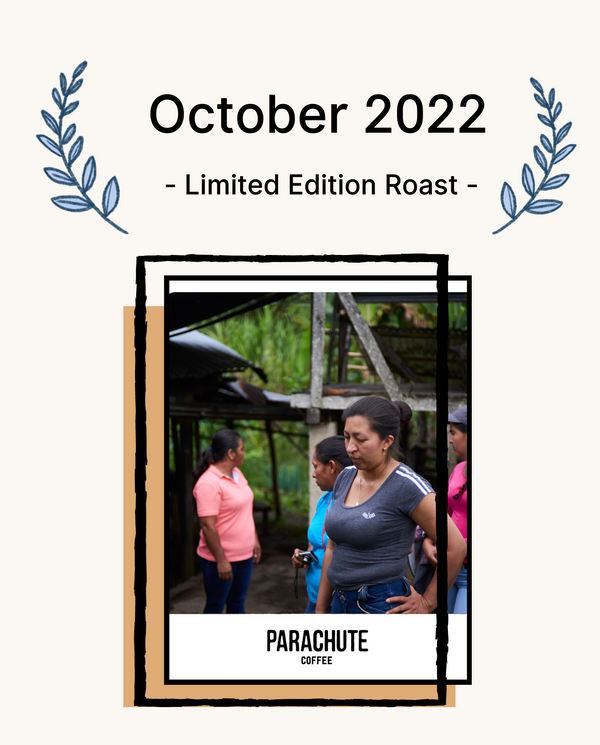
Country: Colombia
Name: Colombia San Agustin
Producer: Los Naranjos Asociación
Region: San Agustín, Huila
Altitude: 1750-1950 meters asl
Process: Washed
Your October Coffee is Colombia San Agustin
This Colombian offering comes from contributions of multiple smallholder farmers that reside in the areas surrounding the town of San Agustín, Huila. In this specific region of Colombia, the average farm size is about 2.5 hectares. This equates to about 12,000 trees per farmer; and, if all goes well with harvest and processing, an average of 0.7 kilograms of exportable green coffee per tree, per year. After accounting for defects and all lower-quality beans, the average farmer in San Agustín is producing about 15–25 bags of exportable coffee per hectare, per year. As for which bags pass the quality control inspections and are accepted into microlot offerings—this number is rather small.
This offering is just that: the top tier of quality from multiple smallholding producers. It has been cupped, vetted, and blended together to produce a regional offering that allows more farmers to receive more payment for better-quality coffee.
VARIETAL: COLUMBIA, CASTILLO, CANTURA, TABI
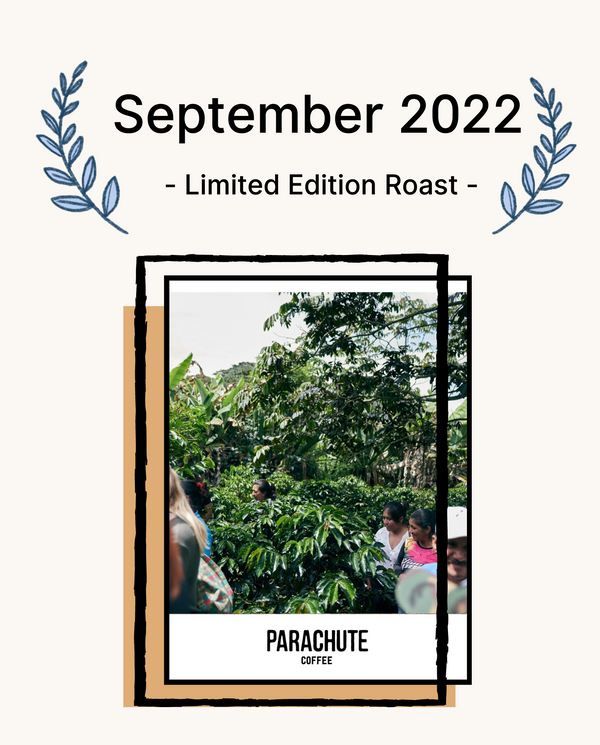
Country: Colombia
Name: Tanzania Ichesa AB
Producer: Carlos Gustavo Gonzalez
Region: Tierras Blancas, Inzá, Cauca
Altitude: 1,830 meters asl
Process: Washed
Your September Coffee is La Cabana - Inza - Cauca
Carlos Gustavo Gonzalez owns a 1.8-hectare farm called Bella Vista, where he grows several varieties of coffee, including Typica and Caturra along with the Colombian varieties of Colombia and Castillo. He is careful to harvest the coffees when they are their ripest: bright red cherries for the Typica and Caturra, purple for Castillo, and dark yellow for Colombia. He puts his coffee through what's called a"double fermentation" by producers who work with Banexport: First the coffees are placed in a hopper after picking, where they sit for 12 hours; then the are depulped and fermented in a tank for 24 hours. The parchment is washed three or four times, and then dried in a gable-roof dryer for about 14 days.VARIETAL: COLUMBIA, CASTILLO
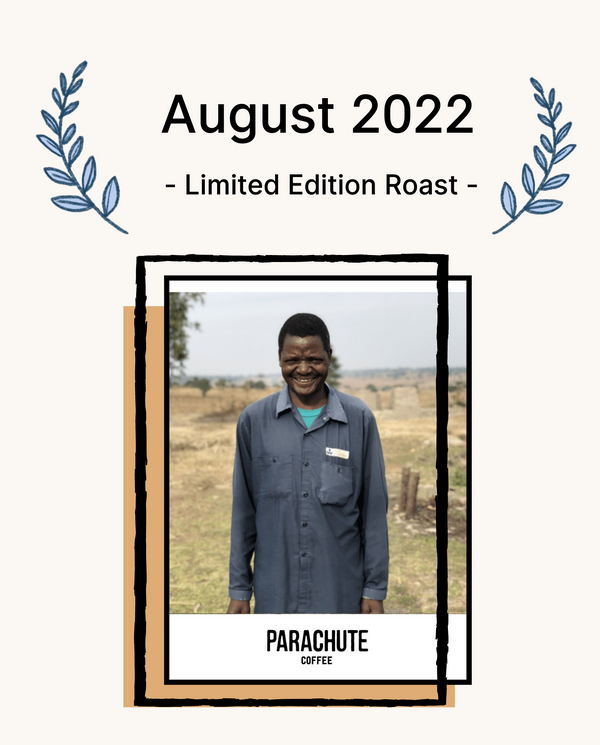
Country: Tanzania
Name: Tanzania Ichesa AB
Producer: 179 smallholder farmers
Region: Ichesa, Ivugula, Shomola, and Mlowo villages
Altitude: 1,600 meters asl
Harvest: June- August
Your AUGUST Coffee is Ichesa Amcos
Ichesa AMCOS coffee processing unit was built in 2012 and currently serves about 179 producers in the surrounding villages, each of whom own1 hectare of land or less, on average. There are several varieties grown in the area, including Bourbon derivatives. The producers deliver their cherry to the station, where it is processed using a Penagos depulper, and the coffee is immediately graded in washing channels before being fermented for 10–12 hours underwater. Drying takes about 9–14 days on average.
This ACMOSCPU supports local smallholders by offering shade trees and soil inputs to improve farm health and coffee quality. Ichesaalso seeks to build a new warehouse for local storage, which will also improve quality and coffee stability.
VARIETAL: BOURBON, N39, KT 423

Country: Ethiopia
Name: Ethiopia Sodu
Region: Uraga, Oromia
Altitude: 2200-2250 masl
Process: Washed
Your JULY Coffee is Ethiopia Sodu
The Sodu washing station is located 2.5km from the town of Hara Adama, in Guji's Oromia district of Ethiopia. Coffees from this station are delivered by local farmers daily, purchased in cherry, and processed accordingly. Typically, washed coffee are depulped on the same day, fermented overnight before being washed clean and dried on raised beds. It takes 8-15 days to fully dry washed coffees under the sun.
Coffees in Ethiopia are typically traceable to the washing station level, where smallholder farmers—many of whom own less than 1/2 hectare of land, and as little as 1/8 hectare on average—deliver cherry by weight to receive payment at a market rate. The coffee is sorted and processed into lots without retaining information about whose coffee harvest is in which bag or which lot.
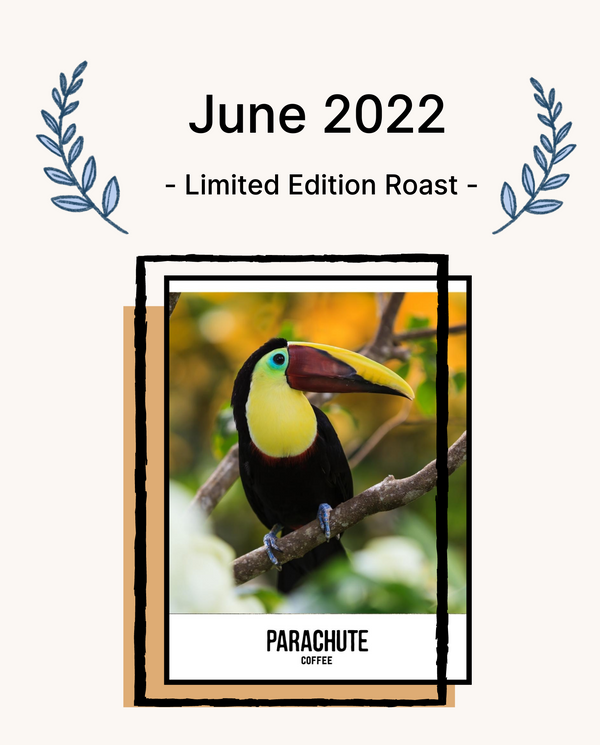
Country: Costa Rica
Name: Costa Rica La Loma
Region: Cobán, Alta Verapaz
Altitude: 1800-2200 meters
Process: White Honey Processed
Your JUNE Coffee is Costa Rica La Loma
This Cataui honey-processed coffee comes from the Tarrazu region of Costa Rica, grown at 1800-2000m altitude with a plant age average of 16 years. The farmer, Hector Bonilla, had always dreamed of managing a cooperative of his own. His passion for coffee inspired his children, who left their line of work to join his farm in adulthood.
Coffee grows in eight coffee regions throughout Costa Rica. In the central and northern highlands where most specialty coffee is found, coffee grows from 1200-1700 meters. Ninety percent of Costa Rican coffee is grown by 50,000 farmers on less than 5 hectares. Although nearly all Costa Rican coffee is wet milled, the country produces a wide variety of honey processed coffee. Coffee is dried using both patios and mechanical dryers. Costa Rica grows Typica, Caturra, Catuai, Villa Sarchi, Bourbon and Geisha.
VARIETAL: CATUAI
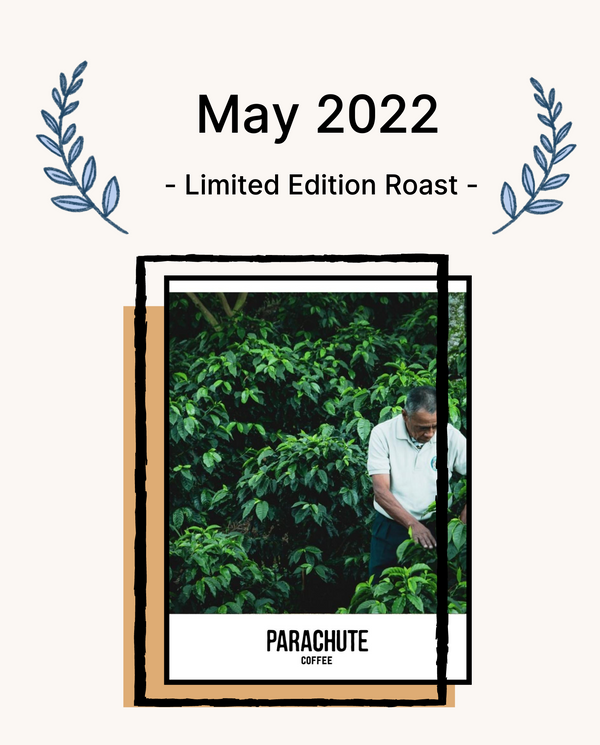
Country: Guatemala
Name: Guatemala Chicoj
Region: Cobán, Alta Verapaz
Altitude: 1,490 - 1750 meters asl
Process: Washed
Your MAY Coffee is Guatemala Chicoj
The Chicoj cooperative is made up of Q’eqchi Guatemalans. The history of the cooperative's name, Chicoj, comes from the Q’eqchi word for mask. They chose this name due to the large mask-shaped rock found in their community.
The cooperative was founded in 1985, by 21 associates. In the beginning, coffee production was minimal, around 38,600 - 42,750 pounds of coffee cherries a year, but in time the associates managed to get credits, training, and technical assistance to achieve better coffee management, learn how to make a seedbed, how to take care of the warehouse and even how to improve the wet mill process. The improvements helped increase coffee production and processing, and more work opportunities opened up. The development of this cooperative not only helped the members of the community but brought more people from the surrounding villages in. This cooperative now has more than 400 members. Nowadays, they process about 4,000 pounds of coffee cherries per day at the mill, and by the end of the harvest will have processed around 2,700,000 pounds of coffee cherries.
VARIETAL: BOURBOON, CATURRA, SARCHIMOR, ANACAFE 14
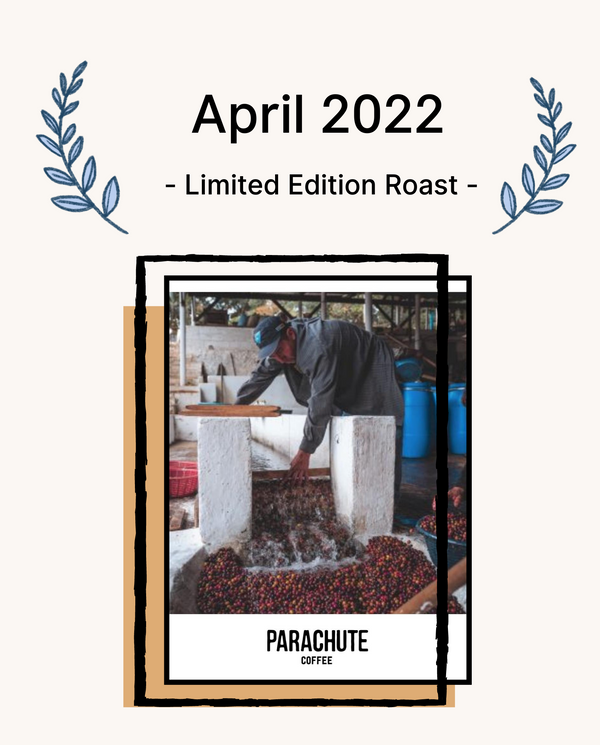
Country: Colombia
Name: Serrania de Las Minas
Region: Tarqui, Huila
Altitude: 1,650 - 1950 meters asl
Process: Washed
Your April Coffee is Columbian Serrania de Las Minas
This offering is a blend of small lots from various producers that live in the Serrania de Las Minas area of Huila's Tarqui municipality located in Southwestern Colombia. Huila is nestled in-between the Central and Eastern ranges of the Andes, making it one of the most unique coffee-growing areas we've experienced — and one of the most complex. Its terroir, climate, and harvest cycles all contribute to the quality of coffee produced here. Although it is difficult to generalize the profile, we typically find commonalities of citrus fruits and brighter acidity in the cup. The most impressive quality behind the coffees coming out of Huila lies in the people producing them. Coffee farmers in Huila are some of the most dedicated, hard-working, and passionate people we have had the privilege to develop relationships with and represent through sharing their coffees with roasters around the world.VARIETAL: CATURRA, CASTILLO, COLUMBIA
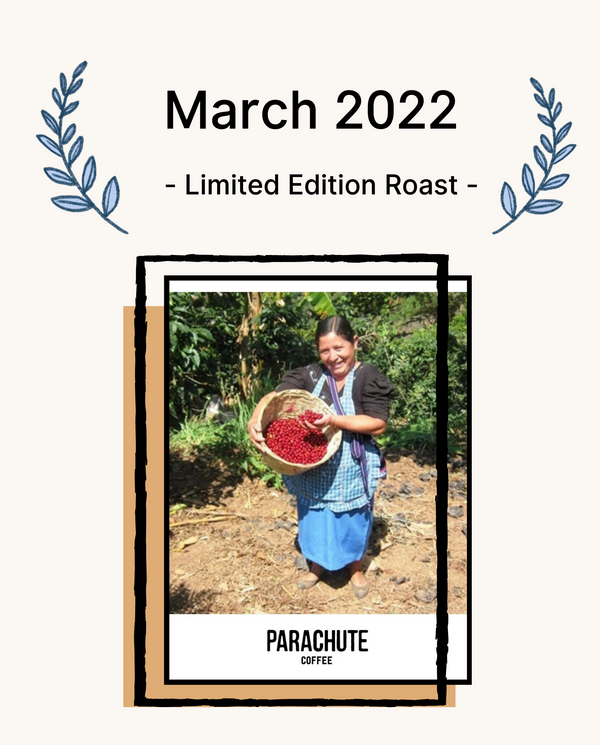
Country: Union Cantinil
Producer: Franciso Bravo
Region: Huehuetenango
Altitude: 1,700 masl
Process: Washed
Your March Coffee is Guatemala Huehuetenango - Franciso Bravo
This is an SHB EP grade washed coffee from the Union Cantinil municipality located in the Huehuetenango department of Guatemala. There are as many as 76 small producers, with farms averaging 1.5 hectares in size, that contribute to this lot.
Guatemala is the 10th largest coffee origin in the world, blessed with over 300 microclimates, rich volcanic soil and a long artisanal tradition of coffee production. The Huehuetenango region is highlands near the border with Mexico.
Huehuetenango coffee is grown in the highland regions of northern Guatemala, producing perhaps the most distinguished Guatemalan coffee as it is often considered the best in the country overall. Guatemalan coffees are true central American coffees.
VARIETAL: CATURRA, BOURBON, TYPICA, CATUAI

Country: Guatemala
Name: Finca Santa Isabel
Producer: Alex Keller
Region: Santa Rosa
Altitude: 1,350 mals
Process: Washed
Your February Coffee is Guatemala Santa Isabel
This single farm select Cimarron Organic, from renowned producer Alex Keller's Andromeda lot in Sant Rosa, is classic and sweet with a surprising lingering limey quality.
In 1899, Federico Keller settled in Pueblo Nuevo Viñas, Santa Rosa, Guatemala, naming his farm Finca Santa Isabel in honor of his wife. Over the last century the family has endeavored to produce coffee to the highest certification standards, to live in harmony with their community and surroundings and to engage in social development and conservation, knowing this holistic approach produces a more honest cup. We're working with the 5th generation of the Keller family now, and are proud to offer their organic coffees.
This region is typically dry in climate, and all coffee is organically grown using soil cover and under legacy shade trees, supporting fertility and biodiversity. Coffee is grown between 1200 - 1400 MASL, and is carefully selected using multiple picking cycles for quality. To counteract the effects of climate change, more shade trees have been planted, and disease tolerant varieties are being cultivated, including Anacafé 14, Sarchimor, and Colombia.
VARIETAL: PACHE, CATURRA, BOURBON
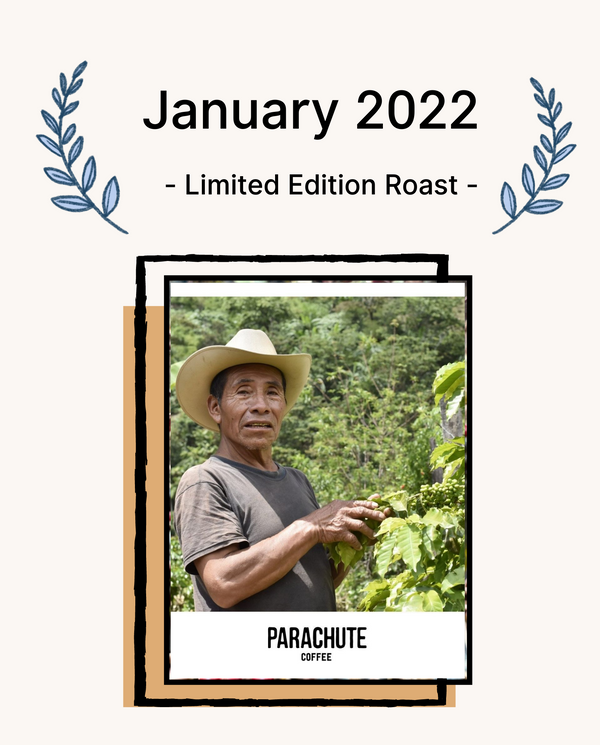
Country: Guatemala
Name: Arabica
Farm: Jabiru Union Cantinil
Region: Huehuetenango
Altitude: 1,500 - 1,900 meters asl
Process: Washed
Your January Coffee is Guatemala Huehuetenango -Jabiru Union Cantinil
This is an SHB EP grade washed coffee from the Union Cantinil municipality located in the Huehuetenango department of Guatemala. There are as many as 76 small producers, with farms averaging 1.5 hectares in size, that contribute to this lot. Varieties harvested include Bourbon, Caturra, Typica, and Catuai. Growing altitude is around 1700 masl.
The coffee is fully processed by smallholder farmers. Cherries are harvested ripe and them de - pulped usually by either manual or small - motored pulpers. This is then left to ferment overnight until the coffee’s remaining mucilage ahas broken down. Washing is then carried out, usually in specialized channels.The washed parchment is always sun dried as the small holders don’t have access to mechanical driers.
Coffee farming practices are similar to other countries in the region, but Guatemala has an abundance of water, volcanic soil, and very distinct micro - climates compared to it’s neighbors.
VARIETAL: CATURRA, BOURBON,CATUAI, PACHE
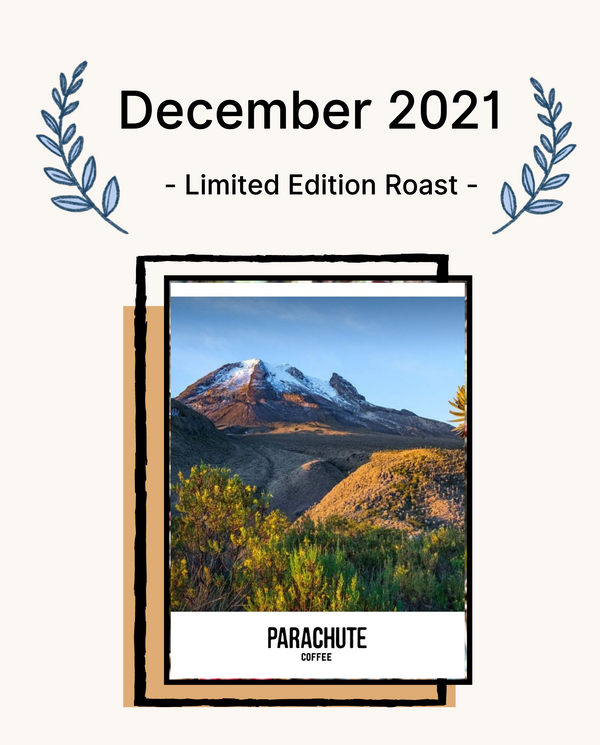
Country: Tolima, Colombia
Name: Colombian Dulima
Farm: Neiva Mill
Region: Central Huila
Altitude: 1,600 - 1,900 meters asl
Process: Washed
Your December Coffee is Colombian Select Dulima
Colombia Dulima is an Excels EP grade coffee sourced from high altitudes in the Colima and Hula growing regions. As an excellent single origin, this washed coffee is smooth and clean, with a pointed acidity and good body.
The area around the volcano Colima is not rich in volcanic soils, it is a “neotropical high mountain biome” known for dramatic fluctuations in temperature. The are around Tolima is the largest paramo on earth. Paramo are known for dramatic fluctuations in temperature, from below freezing at night to nearly 90 degrees Fahrenheit during the day, described as summer every day and winter every night. These fluctuations-at lower altitudes where they are no so dramatic-are great for growing coffee. Despite these conditions, people have lived on the paramo for thousand of years. The Pijaos people were native to the region now known as Tolima long before the Spanish arrived. They fought hard agains the invaders and when they finally retreated they moved into the highlands around Nevada del Colima, the volcano they called Dulima, meaning Snow Queen, and a name that also serves synonymously as identification of their homeland. Dulima is named for the spirit of the Pijaos people and their Snow Queen who, unbeknownst to them, created a superior environment for growing coffee.
Variety: Caturra, Castillo
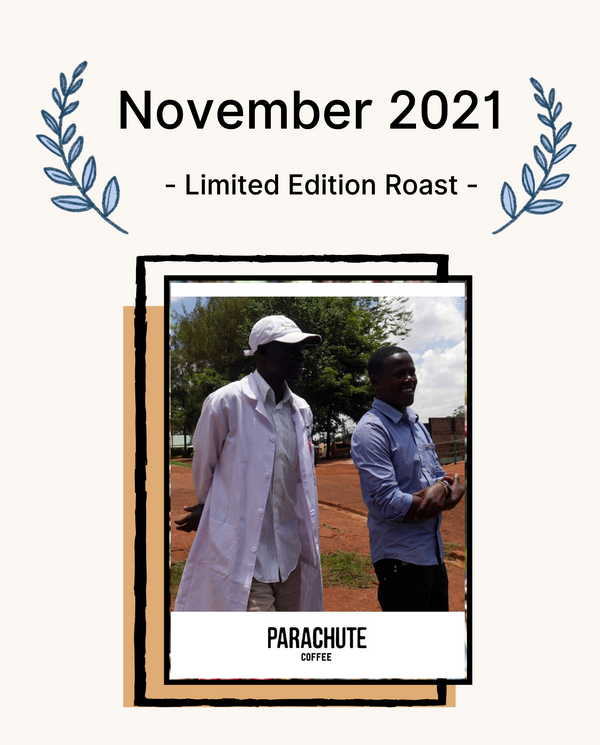
Country: Ruiru, Kenya
Name: Rukira AB
Farm: Rukera Farm
Region: Kiambu Country
Altitude: 1,500 - 1,600 meters asl
Process: Processing Sun-dried on African beds
Your November Coffee is CRI - Rukira AB - Kenya
This exceptional AB lot was produced at the historic Rukera Farm, owned and operated by Kenya’s Coffee Research institute, one of the country’s primary agricultural bodies, As one of the country’s key colonial crops, it is perhaps not surprising that investment in coffee research in Kenya dates back to the beginning of the 20th century.
During the harvest, only the ripest cherries are picked at each pass. These are delivered on the same day to the ‘factory’ (as Kenyan washing stations/wet mills are called), sorted to remove any damaged or underripe cherries, and pulped on the farms’ 4 disk pulper. The pulped coffee is then fermented for around 12 hours before being fully washed in clean water pumped from the Ruiru River to remove all the remaining mucilage.
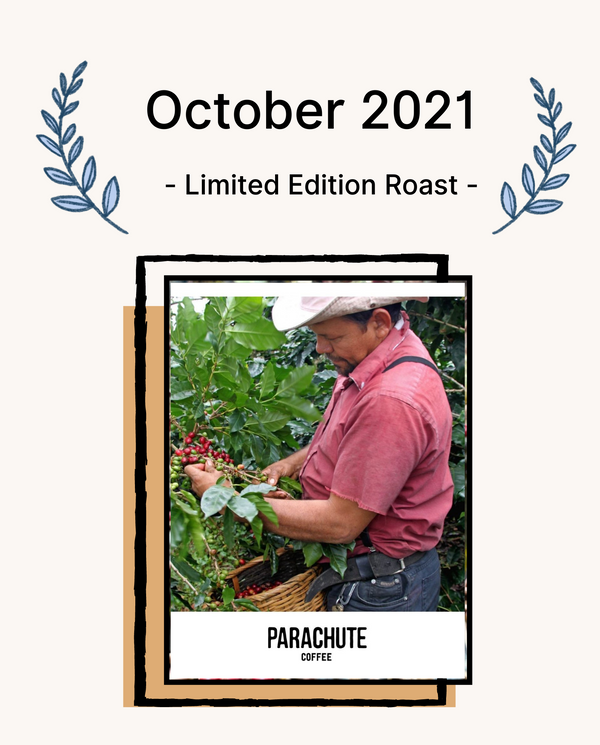
Country: Hondura
Name: Fredy Hernandez Vasquez
Farm: Quebrada Onda
Region: Lempira
Altitude: 1,500 - 1,700m
Process: Washed
Your October Coffee is Honduras Lempira Catuai
This coffee comes from the Lempira district of Honduras. It is cultivated at 1500-1700m, in Quebrada Onda by Fredy Hernandez Vasquez. After washing, it is ration dried.
Quebrada Honda is located in the district of Chepigana along the Panamerican Highway in the province of Darien. Quebrada Honda is largely an agricultural community, where residents work on farms to produce crops such as coffee, beans, corn plantains and yams. These agricultural activities are the main source of income for 90% of residents. Within Quebrada Honda is a single primary school, where students from kindergarten to 6th grade attend classes. Quebrada Honda does not have it’s own health center, forcing residents to travel to Santa Fe for medical or dental care.
VARIETAL: CATUI
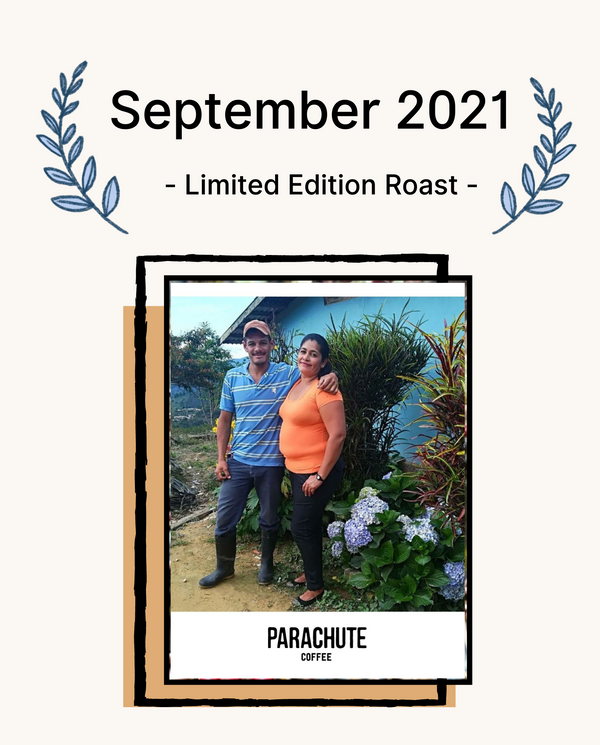
Country: Honduras
Name: Hector Ventura
Farm: Finca El Naranjo
Region: Lempira
Altitude: 1,750 - 1,8500 m
Process: Washed
Your September Coffee is Finca El Naranjo
Prior to 1900 coffee was essentially a garden crop in Honduras, grown on small lots of land and traded within the country for internal consumption. Banana was king well into the 20th century. There eventual and gradual decline in banana production over the decades coincided with a slow but steady growth in coffee production. Today, Honduras is the largest coffee producer in Central America and among the largest worldwide, exporting more than 6 million bags. More than 60% of Honduran coffee is grown above 1,200 meters and almost all on small to medium sized farms.
Within the community of Tapuiman, Hector Ventura operates a 2.6 acre farm named El Naranjo. Hector has grown up within the area, selling his family’s coffee in the form of cherry locally. For the last three years he has improved his farm management by controlling the pH of his soil, organically fertilizing by utilizing compost, and implementing methods to take care of the farm and improve the livelihood.
VARIETAL: CATUI
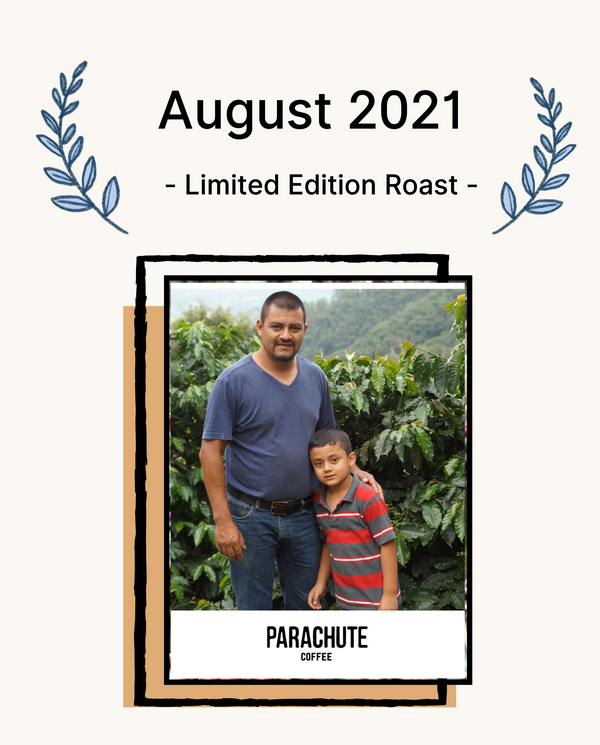
Country: Guatemala
Name: Carlos Gomez
Farm: Finca El Pamarito
Region: El Progreso
Altitude: 1,700 - 1,900 masl
Process: Washed
Your August Coffee is Sierra de las Minas
Sierra de las Minas mountain range in eastern Guatemala, Finca EL Pamarito reaps the benefits of its proximity to such a towering geologic structure. Extending 15 - 30 km, huge by the valleys of the Polochic, Motagua and Salama rivers create varying biomes provides the ideal climate and soil to grow coffee. The name translates to mountain range of the mines’ due to the jade, marble and other mineral quarries. This is home to Mesoamerica’s largest cloud forests and houses a biodiverse array of ecosystems. Approximately 70% of all bird and mammal species in Guatemala and Belize are located here. Some species include the margay, cougar, and the iconic quetzal. The cooler temperatures and higher altitudes allow for a slower maturation of the coffee, cherry, improving sugar development and improving quality.
Forty years ago, Don Higinio Gomez, was the first producer in the area to transition to coffee rather than continuing potato production which was more common at the time. Now, Don’s son Carlos runs and manage the 60-ha farm that is carefully intercropped with native forest shade.
VARIETAL: CATURRA, BOURBON, CATIMOR
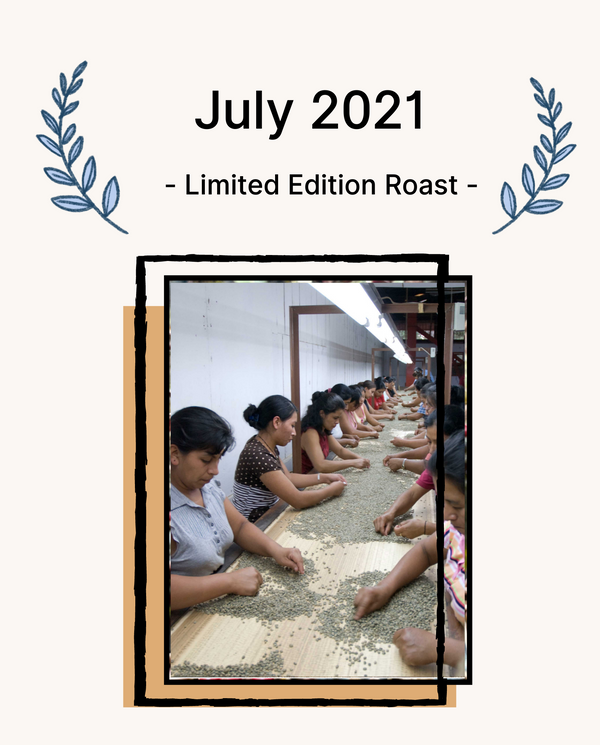
Country: El Salvador
Name: The Alfaro Family
Farm: Finca El Carmen
Region: Apaneca, Ahuachapan
Altitude: 1,300 masl
Process: Fully washed
Your July Coffee is Finca El Carmen
El Salvador’s Apaneca - llamatepec mountain range is one of Central America’s prime specialty coffee producing areas. The estate was founded in the middle of the 19th century when Antonio Jose Alfaro acquired a plot of land near the village of Ataco - meaning “Site of Elevated Springs’ in the indigenous Nahuatl language - where he started to produce coffee. The estate’s coffee is produces under approximately 60% shade cover, which is required for the coffee to ripen evenly. During the harvest, the red and orange Bourbon cherries are hand - picked only when perfectly ripe and de pulped the same day. The beans are then naturally fermented ripe and de-pulped the same day. The beans are then naturally fermented, washed with pure spring water, and sun - dried on clay patios.
We're only available in Canada right now and couldn't be more sorry or more Canadian.